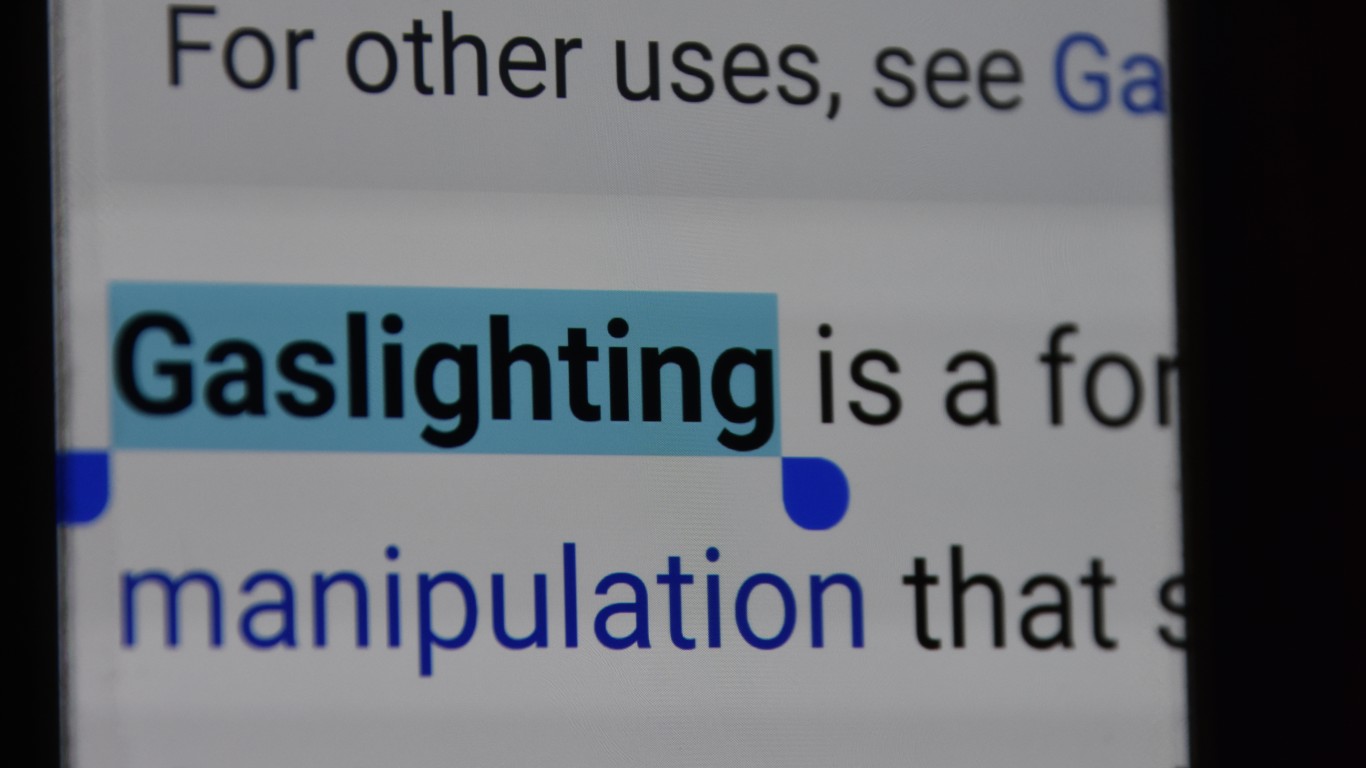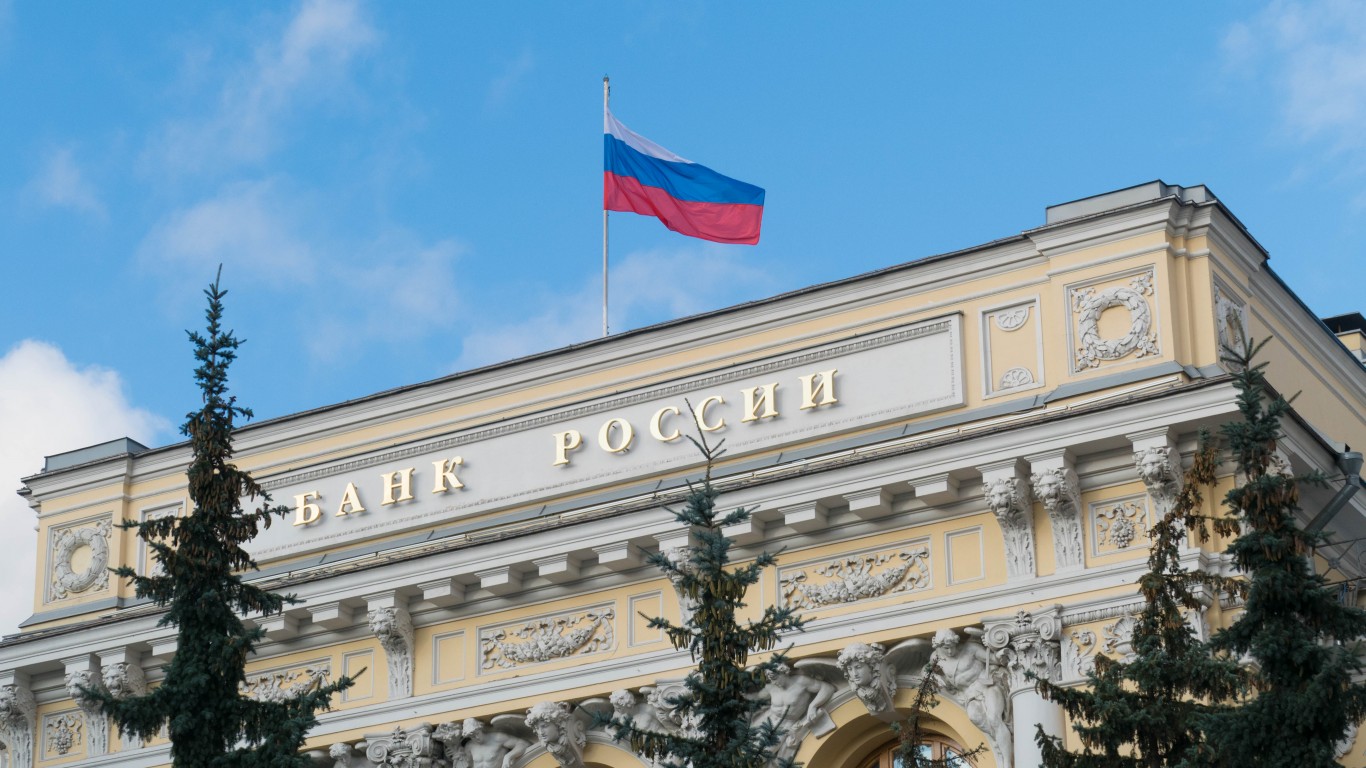
Each year, the folks who compile the Merriam-Webster dictionary determine the word of the year. The determination is made by logging the number of times a given word is looked up on the Merriam-Webster website during the year and comparing that to the number of look-ups the previous year and earlier. (Here are 36 old words we use today but with completely new meanings.)
For 2022, the word of the year is “gaslighting.” Merriam-Webster defines gaslighting as “psychological manipulation of a person usually over an extended period of time that causes the victim to question the validity of their own thoughts, perception of reality, or memories and typically leads to confusion, loss of confidence and self-esteem, uncertainty of one’s emotional or mental stability, and a dependency on the perpetrator.”
Gaslighting was the most-searched word of the year, even though no single event set off word sleuths to track down its meaning. The term comes from the 1938 British play, “Gas Light,” by novelist and playwright Patrick Hamilton. It later became two separate films – one British and the other American – both called “Gaslight,” in the 1940s. The American movie was a psychological thriller starring Charles Boyer as a husband tormenting his wife (Ingrid Bergman) with the intention of driving her insane – by, among other things, raising and lowering the gas lights in the house – to institutionalize her so he can find jewelry hidden in the attic.
Click here to see the words of the year according to Merriam Webster
There were eight other words or acronyms that had amateur wordsmiths scrambling for the dictionary in 2022 – oligarch, omicron, codify, LGBTQIA, sentient, loamy, raid, and queen consort. Interest in all eight was triggered by one or more events that occurred during the year, prompting a surge in searches online. (Can you answer these real “Jeopardy!” questions about words?)

Gaslighting
The extended psychological manipulation of someone leading them to question their own perceptions or sanity became known as “gaslighting” thanks to a 1938 British play called “Gas Light” and a subsequent movie, “Gaslight” (1944). It came into relatively common use only in the 2010s, though – and today “gaslighting” has become the favored word to describe the perception of deception in this age of misinformation and “fake news.”
[in-text-ad]

Oligarch
In general terms, an oligarch is a member of an oligarchy – a small group that controls an institution or a country – but it has come to be applied today primarily to people in Russia and other former Soviet states with considerable wealth and influence largely obtained through acquiring former state assets. Interest in the term surged after the Russian invasion of Ukraine in February. Following that incursion, many countries such as the U.S. and United Kingdom imposed sanctions on Russian oligarchs and their families. Lookups for the word “oligarch” leaped 621% in early March 2022.

Omicron
In November 2021, the World Health Organization designated the word “omicron,” the 15th letter of the Greek alphabet, to identify the most recent variant of the Covid-19 virus. The WHO previously used the Greek letters alpha, beta, gamma, and delta to name the virus’ variants.

Codify
Searches online for the word “codify” – which usually means to classify or systemize – surged 193% earlier this year after the Supreme Court’s decision to overturn Roe v. Wade on June 24. Lookups for the word spiked 8,304% on June 30, the biggest jump in one day, after President Biden said he would back ending the congressional filibuster in order to codify the national right to an abortion.
[in-text-ad-2]

LGBTQIA
The acronym LGBTQIA adds some letters to the more familiar abbreviations LGBT and LGBTQ. The full abbreviation stands for lesbian, gay, bisexual, transgender, queer/questioning (one’s sexual or gender identity), intersex, and asexual/aromantic/agender. Interest in the acronym surged in June and November because of two events that could not have been more disparate. The abbreviation climbed 1,178% in June because that is Pride Month, when gay culture, rights, and equality are celebrated. In late November, searches skyrocketed again because of a shooting in a gay night club in Colorado that killed five people.

Sentient
Searches for the word sentient, meaning responsive to sensory stimuli, rose 480% in June when Blake Lemoine, a Google engineer, claimed that the company’s artificial intelligence chatbot, LaMDA, had developed a human-like consciousness. Google denied the claim and fired Lemoine, saying his claims were “wholly unfounded” after reviewing them.
[in-text-ad]

Loamy
Credit the online puzzle-solvers toiling over online word game Quordle with bringing “loamy” – which Merriam Webster defines as “consisting of loam, a soil consisting of a friable mixture of varying proportions of clay, silt, and sand” – to the forefront. The word was a Quordle answer on Aug. 29, leading to a search surge of 4.5 million – yes, million – percent.

Raid
Lookups of the word “raid,” meaning a brief,usually hostile attack by a small force, spiked 970% in early August after the FBI executed a search warrant at Mar-al-Lago, the Florida home of former president Donald Trump, to seek classified documents the ex-president allegedly had stored there. The FBI’s action prompted searches of worlds like “trove” – a large amount of something collected – to describe the volume of material found there and “banana republic” – a term used to describe a despotically run country, which Trump defenders claimed described the way the U.S. government was treating the ex-president.

Queen Consort
When Queen Elizabeth died in September after 70 years as the reigning British monarch, her son Charles ascended to the throne. Charles’ wife Camilla is referred to as Queen Consort, the wife of the reigning king. The term, largely unfamiliar to the public, prompted a surge of online searches. Camilla is not in line to succeed to the throne. Her duties will include going on official trips, appearing in public on behalf of the royal family, and supporting charities. Prince Philip, the husband of Queen Elizabeth, had had a similar status and was known as the Prince Consort.
Find a Qualified Financial Advisor (Sponsor)
Finding a qualified financial advisor doesn’t have to be hard. SmartAsset’s free tool matches you with up to 3 fiduciary financial advisors in your area in 5 minutes. Each advisor has been vetted by SmartAsset and is held to a fiduciary standard to act in your best interests. If you’re ready to be matched with local advisors that can help you achieve your financial goals, get started now.
Thank you for reading! Have some feedback for us?
Contact the 24/7 Wall St. editorial team.